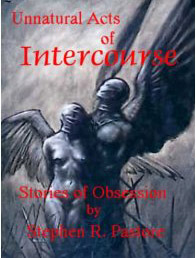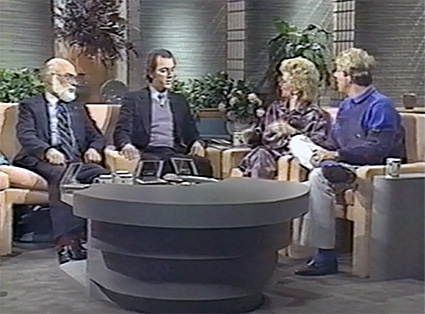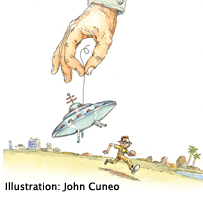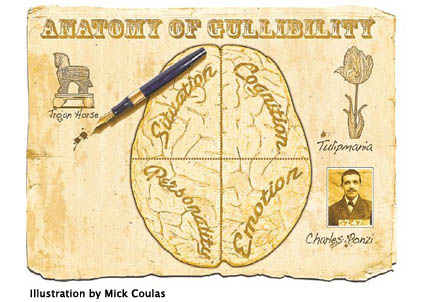Here’s the sixth installment of LiteratEye, a series found only on The Art of the Prank Blog, by W.J. Elvin III, editor and publisher of FIONA: Mysteries & Curiosities of Literary Fraud & Folly and the LitFraud blog.
and the LitFraud blog.
LiteratEye #6: Tracking an Elusive Author
By W.J. Elvin III
March 19, 2009
 In the last column there was a sort of drive-by mention of author Stephen R. Pastore and the possibility that some of his prominence and recognition as an author is self-imposed. That observation was inspired by a reporter”™s challenge to him and some questions raised by Wikipedia editors regarding his credibility. So far, rather than coming to the fore in his own defense, Pastore seems to be fading deeper into the literary mists.
In the last column there was a sort of drive-by mention of author Stephen R. Pastore and the possibility that some of his prominence and recognition as an author is self-imposed. That observation was inspired by a reporter”™s challenge to him and some questions raised by Wikipedia editors regarding his credibility. So far, rather than coming to the fore in his own defense, Pastore seems to be fading deeper into the literary mists.
This is beginning to look like a story that The New York Times and Washington Post will be digging into soon. So of course I wanted The Art of the Prank Blog readers to be able to say they saw it here, some of it at any rate, first. Why haven”™t the heavyweights weighed in already? Well, venturing a guess, Pastore hasn”™t yet appeared on Oprah, and that, the way I”™ve got it figured, is the trigger for national media attention these days. First you spoof Oprah, then you show up on big media radar.
Pastore is a winner of the Aldous Huxley Prize for literature. The prize may not ring bells of recognition with you, but it was listed on a site devoted to literary awards. However, that site has since disappeared. When you dig it out of the Internet archives, there is indeed mention such an award, but details have been scrubbed. Continue reading “LiteratEye #6: Tracking an Elusive Author”



 Here’s what you’ve been told: “There’s a sucker born every minute.” “Take or be taken.” “Believe none of what you hear and half of what you see.” These aphorisms are so ingrained in American life, they’re practically commandments. And for good reason: We are a credulous people. For proof, open your spam folder and count the chain emails from 1998 that are still coming in, dutifully forwarded by friends and relatives. Or consider that new Facebook pal whose name seemed familiar enough when you hit Confirm. We are, today, the same easy marks who ran screaming from Orson Welles’ made-up Martians and flocked to see the Cardiff Giant. So we’re defensive. A hoax, we are taught, is an invasive, aggressive stratagem””a nefarious short-circuiting of our natural social instincts, a hack of Trust itself, a deterministic, zero-sum shell game with a clear winner (the prankster) and loser (the gull).
Here’s what you’ve been told: “There’s a sucker born every minute.” “Take or be taken.” “Believe none of what you hear and half of what you see.” These aphorisms are so ingrained in American life, they’re practically commandments. And for good reason: We are a credulous people. For proof, open your spam folder and count the chain emails from 1998 that are still coming in, dutifully forwarded by friends and relatives. Or consider that new Facebook pal whose name seemed familiar enough when you hit Confirm. We are, today, the same easy marks who ran screaming from Orson Welles’ made-up Martians and flocked to see the Cardiff Giant. So we’re defensive. A hoax, we are taught, is an invasive, aggressive stratagem””a nefarious short-circuiting of our natural social instincts, a hack of Trust itself, a deterministic, zero-sum shell game with a clear winner (the prankster) and loser (the gull). In the last column there was a sort of drive-by mention of author Stephen R. Pastore and the possibility that some of his prominence and recognition as an author is self-imposed. That observation was inspired by a reporter”™s challenge to him and some questions raised by Wikipedia editors regarding his credibility. So far, rather than coming to the fore in his own defense, Pastore seems to be fading deeper into the literary mists.
In the last column there was a sort of drive-by mention of author Stephen R. Pastore and the possibility that some of his prominence and recognition as an author is self-imposed. That observation was inspired by a reporter”™s challenge to him and some questions raised by Wikipedia editors regarding his credibility. So far, rather than coming to the fore in his own defense, Pastore seems to be fading deeper into the literary mists. Back in olden times, mankind found it useful to live by mottoes. A motto reduces the helpful lessons of life to three or four words, maybe two, as in the Boy Scout motto: Be Prepared. Or, apropos now: Look before you leap.
Back in olden times, mankind found it useful to live by mottoes. A motto reduces the helpful lessons of life to three or four words, maybe two, as in the Boy Scout motto: Be Prepared. Or, apropos now: Look before you leap.